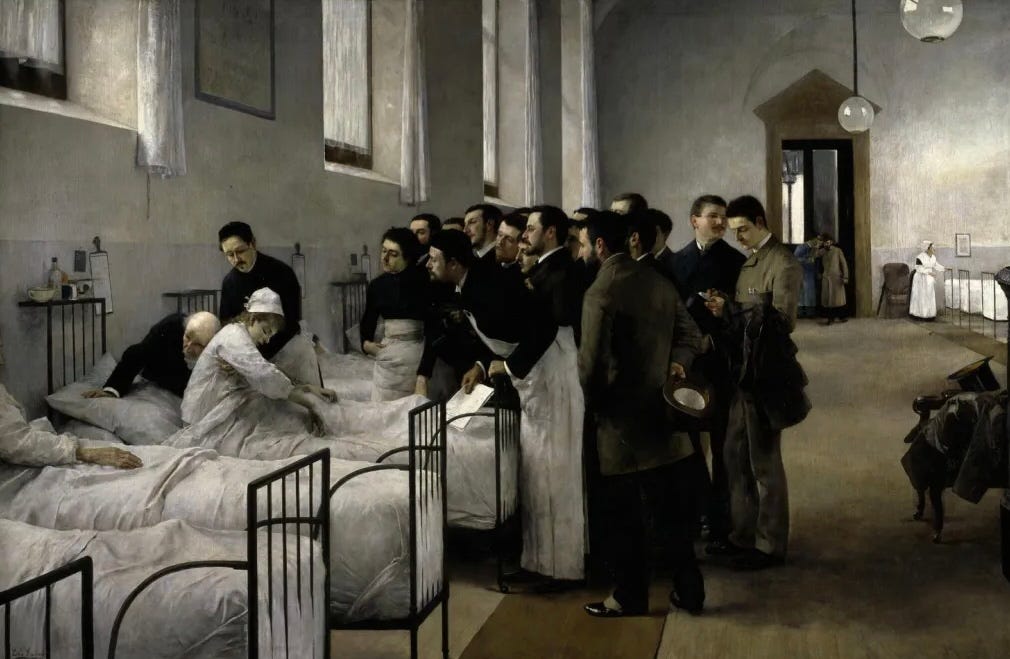Momma’s Words, Momentary Wards
Thoughts while lying on the lobby floor

Time seems to move both slowly and quickly in the hospital. The end of August taught me this lesson with unforgettable dread. My mother had been struggling with abdominal pain, which she dismissed as indigestion. But this pain was severe. That Friday, August 23, I stayed to work the laundromat, and my father took her to the doctor. From there, my mother went to the emergency room. We did not think of her surgical mesh resulting in complications. That operation was about twenty years ago. A medical intervention from so long before does not seem timely—until it resurfaces.
Later, I want to write about the surgical mesh, but, for our purposes, the key takeaway is that my mother nearly died—and could have—from surgery on Sunday, August 25. Her large intestines died, with it having to be removed, including her colon—alongside part of her uterus. She has recovered well following the surgery, but it has not been easy—and will not be. Monday and Tuesday, the first couple of days, were more frightening than words can describe. The first time I saw my mother after surgery, the ventilator and breathing tube had me crying. Not being able to hear her voice right then was a nightmare. I breathed in and out, slightly heavily, like the air had thickened and choked me—as if I would need ventilating next. When I came into the room, I leaned in to kiss her forehead, saying, “Momma? Can you hear me? I love you, Momma.” I held her hand, lying my head alongside it.
When she stayed silent, my mother resembled all mothers who are filled with alarm at the prospect of poverty and death. But when she spoke, her face was again flooded by an invincible, youthful light. Even though she grew thin with sorrow, her voice was never despondent.
- Colette, La maison de Claudine (Claudine’s House)1
On Wednesday, August 28, I came earlier to stay for the entire day and night, sleeping in the lobby outside the MICU. After her kidneys had not functioned over a few days, my mother began dialysis late that afternoon in the form of continuous renal replacement therapy (CRRT). While my father and I figured it would make a positive difference, even urging for it to start as early as that Monday, the results would not be apparent until well into Thursday. But Wednesday remained frightful, and my mother’s condition stayed uncertain even then. That night, I gave her a kiss on the forehead and told her good night. With tears in my eyes, I said, “I am so worried about you, Momma. Good night. I love you so much.”
By Friday, August 30, breathing for herself, Momma was no longer ventilated—and the nurses removed the tube. Following extubation, this fancier-sounding term for taking out the tube, Momma recognized, in order, me, my brother, and my sister-in-law. Her voice tired and hoarse, her eyes widened and startled, her body needing time to heal—but Momma survived.
Recent days have been flowered by Momma’s slow recovery, her gradual return to full consciousness. So, what did I think while lying on the lobby floor? There is the child that I am, terrified Momma would die, knowing I have too scattered a mind to write—and do it very well. I have a few reviews coming soon, which I hope will be of some interest, but discouragement has beaten me repeatedly. My writing process is that I start, write or type some words, stop, add some more, feel too uncertain, stop, and so on. Do these words even matter? I wonder. I lied there, seized by fear, worried Momma would die—and writing for anybody else ceased to mean anything to me. After lying on the lobby floor and fearing Momma’s death, I feel drained. I look at social media notifications—damned relentless noise—and feel hopelessly exhausted. I am suffocated by too much nothing and too little something. Momma’s words outlive it all.
If you are unable to become a paid subscriber through Substack, then please feel free to donate via PayPal, if able. I am grateful for reader support!
Colette, La maison de Claudine (Claudine’s House), 1922, trans. Andrew Brown (London: Hesperus Press, 2006), 112.




I'm so sorry Donovan